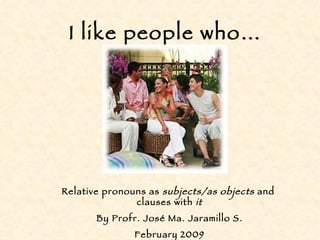
Positive and negative personality traits people look for in partners
- 1. I like people who… Relative pronouns as subjects/as objects and clauses with it By Profr. José Ma. Jaramillo S. February 2009
- 2. What do you think women look for most in a parter? What do men look for most ina parter?
- 6. Complete the chart, write the NOUN. success Intelligence warmth sensitivity attraction play practice passion ADJECTIVE NOUN SUCCESSFUL INTELLIGENT WARM SENSITIVE ATTRACTIVE PLAYFUL PRACTICAL PASSIONATE
- 7. Relative Pronouns as Subject If the relative pronoun ( who, which or that) is followed by a verb, the relative pronoun is a subject pronoun . Example: I like guys. They aren’t too serious. I like guys who/that aren’t too serious. I like girls. They have lot of friends. I like girls who/that have lot of friends. I like people. They aren’t so serious. I like people who/that aren’t so serious I like boys. They are sociable and generous. I like boys who/that are sociable and generous. I like students. They are very creative. I like students who/that are very creative.
- 8. Relative Pronouns as objects If the relative pronoun is not followed by a verb (but by a noun or pronoun), the relative pronoun is an object pronoun . Object pronouns can be dropped in defining relative clauses. Example: I’d prefer someone . I can talk to him easily. I’d prefer someone who/that I can talk to easily.
- 9. I’d prefer a girl . I can trust on her a lot. I’d prefer a girl who/that I can trust a lot. I’d prefer a friend . I can talk him easily. I’d prefer a friend who/that I can talk easily. I’d prefer a boos . I have something common with him. I’d prefer a boos who/that I have something common with. I’d prefer friends . I can visit them all the time. I’d prefer friends who/that I can visit all the time.
- 11. Let’s practice with on your books! More information: [email_address]
- 12. Clauses with it + adverbial clauses with when By Profr. José Ma. Jaramillo S. March 2009 Do you get ANNOYED easily?
- 14. Clauses with it + adverbial clauses with when Subject Verb It When Subject + verb I hate it when someone makes noisy eating I don’t like it when a cell phone rings… I don’t mind it when students come late… I don’t like It when people are serious… It verb object when subject + verb It bother s me when a teacher forgets… It upset s me when a student don’t bring… It bother s me when students come late… It really upset s me when people are serious…
- 16. Let’s practice with on your books! More information: [email_address]
